Startup
The Ultimate Android & iOS App Store List (69 Items) All App Stores
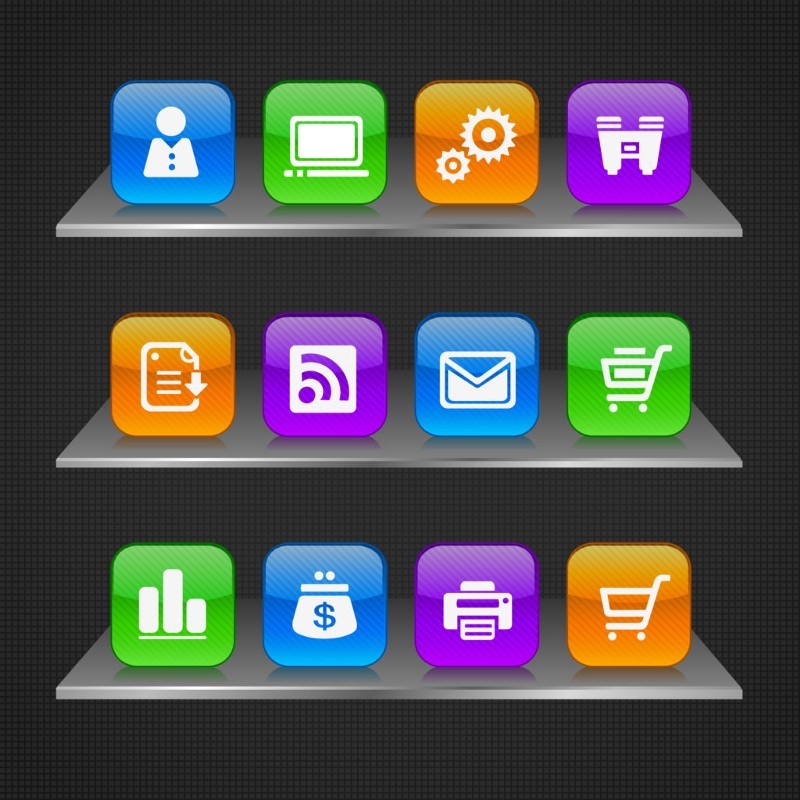
There’s more to app stores than Google Play for Android and Apple’s iTunes and App Store. The obvious names are the Amazon App Store and Chinese giant Baidu, but there are more alternatives still.
If you want to increase the reach of your app to audiences abroad, or if your idea has a specific niche audience, then you might find what you need in our big list of app stores, but don’t forget the top three — competition is fierce, but it’s important to be part of it. .
From country- to platform-specific storefronts, we’ve collected a list of all the places your mobile app can be downloaded onto a device.
Best 19 Android App Stores
The freedom given to developers for the Android platform means many app stores have been created for it, with some focusing on specific niches or languages and others boasting better algorithms and app discovery engines. As of July 2015, Google Play gave Android users a choice of 1.6 million apps, with Apple’s App Store a close second with 1.5 million apps — according to this report by Statista.com, over 100 billion apps have been downloaded from the latter alone.
Android App Stores
Android Tapp — Highly curated Android-only app store for paid phone and tablet apps.
Android Freeware — Does what its name implies: hosts free Android-only applications.
Digital Turbine — Not an appstore but a search engine specific for apps that applies machine learning and stats analysis to give you tailored suggestions app suggestions.
CodeNgo — Fill in a single form to submit your app to more than 30 stores, from Google Play to Amazon, Samsung and more.
AppBrain — Android-specific app market which, as well as aiding discovery of apps in multiple stores (including Google Play) also lets users organise and share their applications.
Some of AppBrain’s offerings

Source: appbrains.com
SlideMe — A curated app store with the specific target of niche markets, basing its targeting on geographic location, device and payment type, among other metrics. Tries to fill the gaps where Google Play doesn’t reach.
AppsLib — Android-tablet-specific marketplace, it’s been inactive for a while but has 38,000 plus apps listed to it.
Soc.io — Apps and ebooks, with music coming soon, are all to be found on this Android marketplace. Bills itself as an Android ‘mobile mall’. Also has its own e-Book reader.
1Mobile — Has increased its apps from 60,000 to 800,00+ in the last three years. Focused on games, Android only.
Nvidia Shield — A highly curated Android app store by Nvidia, covers mostly games but also entertainment apps for Android TV.
AndroidPit — Not just an app store but a good source of app reviews and information. Also has a curated section with apps selected by the Berlin-based editorial team.
mobiles24 — Android and Java only, but should is “coming soon” to the App Store, it is both an app and a content discovery engine.
Aptoide — Lets you create an app store within their own storefront. Currently hosts 199k stores and over 750,000 apps.
Some of Aptoide’s clients
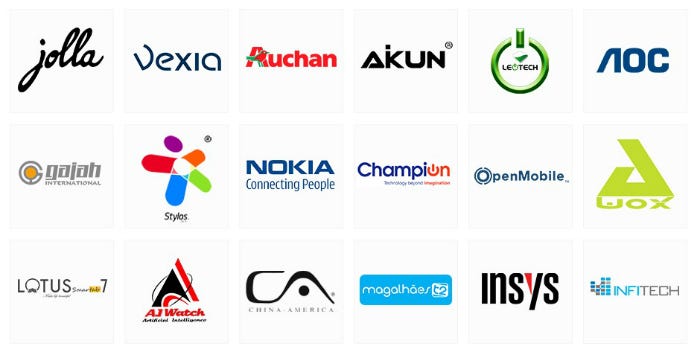
Source: Aptoide.com
Yandex — Android-specific store which allows payment by card or with your mobile balance. Currently claims to contain over 100,000 apps.
Appszoom — A social approach to an app store, it allows users to see what apps their friends and “followed experts” are downloading and using on the same store.
Mobogenie — Has an Android and a PC platform, and offers content like wallpapers and ringtones as well as apps. Claims to have a powerful recommendation engine and puts a high emphasis on security of apps hosted.
AppBackr — Still in public beta, an app discovery engine that is driven by user recommendations and ties suggestions to geolocation.
F-Droid — An app which is itself an app store, not just for Android but for open-source applications (though it runs on Android devices).
MiKandi — Android-only and apparently trusted by 7 million customers, this store focuses on adult games, comics, videos and apps (NSFW).
Cross-platform App Stores – 16 items here
There’s more to mobile devices than iOS and Android, and a lot of stores are now catering to Windows Phone and Symbian, among other platforms. The Amazon and Windows Phone app stores are the third and fourth by number of apps, with 400,000 and 340,000 applications respectively. Some stores, like Kongregate, have focused on the gaming market, while Opera offers cross-platform apps that also work in its web browser. A fair few of these also double as content stores, offering more than just apps but also music, wallpapers and other products.
Amazon Appstore — Amazon’s very own app store sells applications for both Android, its own Kindle Fire and Blackberry. Currently numbers 340,000+ apps and has 15,000+ new apps published per month.
GetJar — Claims to be the world’s biggest open App Store for Android, and has some numbers to back it up, with 800,000+ apps delivered to Android, Blackberry, WindowsMobile and Symbian.
Opera Mobile Store — Very large app store, covers all the major platforms and more, such as Symbian, Windows Mobile and Blackberry.
Mobango — More than just an app store, Mobango allows users to share ringtones, photos and videos too. Has a very useful “search by device” feature too.
Appolicious — Partnered up with Yahoo! this directory aims to provide users with “white-label” app discovery for iOS and Android.
Mobile Gaming — Indie mobile game store, only features Android games but most of them are free.
Mobile Gaming’s Storefront
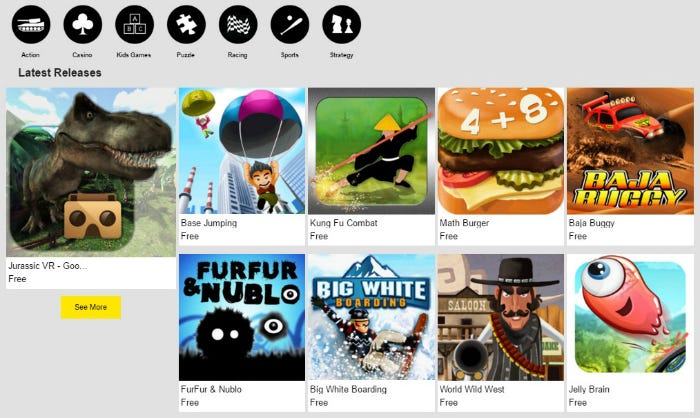
Source: mobilegaming.com
NexVa — Offers multi-platform, localised apps. Specifically aimed at reaching those audiences that don’t have a credit card to sign up to other app stores by using its proprietary neXpayer system.
Kongregate — Famous for its selection of Flash-powered games, this store continues that tradition in offering videogames for the mobile web (and thus mostly cross-platform).
Good — Not an app store but a software platform for enterprises to manage and secure an app eco-system. Powered by Blackberry, it allows employees to use their own devices to access your business’s apps.
WhiteApp — Curated white label apps for both major platforms: if you just want to rebrand an app instead of creating a new one for a campaign or your business, this is a good place to start.
Gamesmob — Very active games-only store. Covers all platforms but it is majority Android. Based in Barcelona, Spain.
Alternative.To– Bills itself as a site for “crowdsourced software recommendations”, so it covers a lot more than mobile platforms. Search for an app and see what users consider to be a valid alternative.
Appland — Both an app store and an app-store manager, allowing you to create your own. Uploading applications is free, and will showcase your apps on the stores maintained by other devs. Pre-installed on operator 3 mobiles.
Itch.io — Great for both game developers and gamers, this is a free and paid-for indie games store that covers all platforms. Has a very large choice, and also has sections for game assets, development tools and books.
Mobile9 — Not just apps but themes, wallpapers and ringtones too. Covers iOS, Android and Windows Phone.
Mobile9’s front page
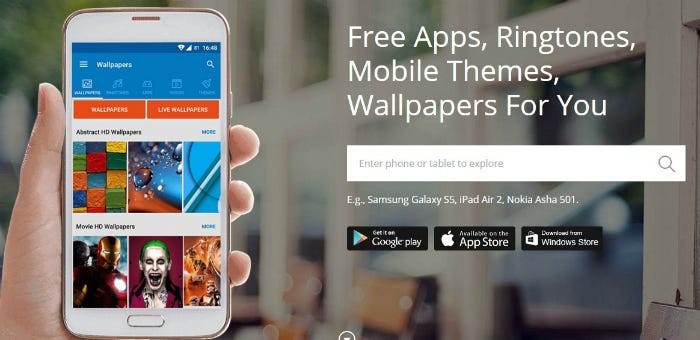
Source: mobile9.com
Exent — Game-focused discovery engine, goes beyond mobile and tablets and extends to PC and TV too.
SexAppShop– Offers a white-label service to create adult-themed apps and app stores for iPhone and Android.
iOS Stores
A necessarily smaller list section given Apple’s tight reign on the apps allowed onto its devices. However, given the statistic that 100 billion apps have been downloaded, cumulatively, from the App Store, there is by no means a lack of coverage.
App Store — The official Apple store for iPhone and iPad, as well as its Mac products. Known for its strict submission requirements, it nonetheless is the first and original app store.
Cydia — An alternative to the App Store made for those who have “jailbroken” devices. Apps can be both free and paid for, and the Cydia app must be installed using jailbreaking tools.
BlackBerry OS App Stores
The fifth-biggest store by the number of apps, with 130,000, the Blackberry is facing tough times: recently, both Facebook and Whatsapp said their apps would no longer be supported on the Blackberry OS. If you want your apps to be usable on the RIM-brand phones, you’ll need to go through these two stores.
BlackBerry World — The official App Store for the BlackBerry platform. Newer phones, however, use the Google Play Appstore, though BlackBerry World is also linked to the Amazon app store now.
CrackBerry Store — More than just an app store, this community is based around cracking and running independent software on BlackBerry specific phones. The app store also features an “Editor’s Choice” section.
Manufacturer-specific App Stores
Handset producers have wisened up to the app market and now offer more than just pre-installed apps on their devices, providing their customers with full-fledged app stores. These have the upside of ensuring the apps are optimised for your specific device, but they can be a bit of a closed shop for developers not within the company.
Samsung Apps — Samsung’s official app store, with categories for its individual devices. Also features apps for Samsung TV and Smart Home products.
LG Smart World — The official app for LG products — has a wide variety of categories, from games to utilities, and of course apps for LG products beyond their mobile range.
CISCO App HQ — CISCO is one of the leaders in enterprise mobility solutions, and this app store reflects that. Chiefly aimed at business owners and entrepreneurs looking for apps to optimise their business.
Lenovo App Store — In Chinese only, but given Lenovo’s size and customer base, its official app store should not be ignored. Lenovo’s apps and devices run on the Android operating system.
China
Considering how massive the app market and mobile phone market is in China, the country deserves a section of its own. The numbers speak for themselves: according to China Tech News, the country increased its mobile phone users by 200 million between 2012 and 2015, and two thirds of all users have downloaded an instant messaging app. The country makes up 30% of the world’s mobile phone market, and about half ($505 billion) of China’s eCommerce sales are made via mobile. On apps specifically, according to China Internet Watch in Q2 2015 over 428 million smartphone users in China used apps downloaded by third-party stores, a 1.9% increase over the previous quarter.
All in all, the market for apps in China is huge and should be part of any mobile app strategy.
Baidu — China’s main search engine also has an app store and developer tools, and has recently launched an English-language version. One of the key advantages, beyond size, is that apps are displayed as results by the search engine.
SkyMobi — The largest mobile game store in China, it was founded by Sequoia Capital and currently has both an English and a Chinese version. Only publishes games but has a massive reach.
Tencent App Gem — Sign up and knowledge of Chinese are required to be able to use this app store properly, as no English version exists, but its worth it, given its 80 million daily users.
Wandoujia — An app store as much as a mobile content search engine, this is one of China’s biggest mobile markets, claiming to reach over 500 million people and have 30 million app downloads a day.
Appchina — Discovery engine, it recommends apps depending on the users location and preferences. Has 30 million users, but no English version.
The Appchina Storefront
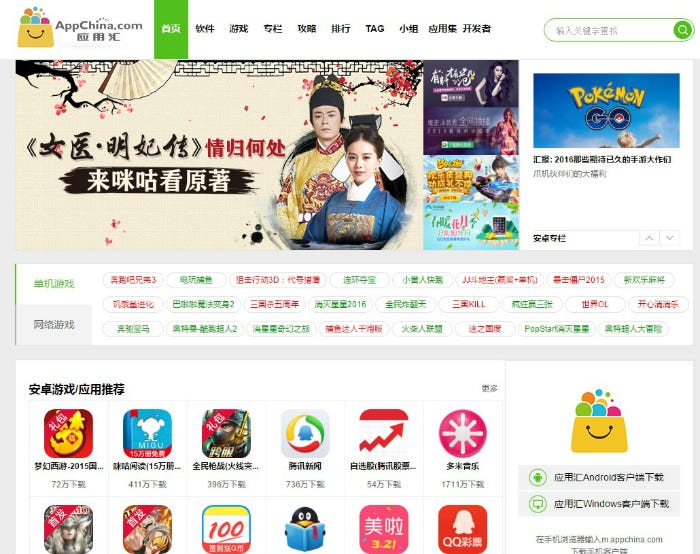
Source: appchina.com
Anzhi — Android-specific app store with a strong community: the store allows users to comment on and recommend apps.
Camangi — Has an English-language version and focuses on Android devices with larger screens (6 to 10 inches).
360 Market — One of the bigger stores in China, claiming 275 million active users and 30 billion downloads, it’s development program is also one of the best-translated.
HiAPK — Focused on Android and implements pre-installs on devices, however once again the language barrier is an issue for anyone who doesn’t know Chinese.
Xiaomi — Privately owned company and among one of the more successful smartphone producers in China.
D.cn — focuses on games and covers all major operating systems.
MaoPao — One of China’s biggest app stores, distributing apps across iPhone, Android and Symbian platforms.
GFan — Appears to be Android and Chinese-only, but has 12 million + customers registered to it.
Liqucn.com — Multi-platform app store covering all sorts of apps and games as well as content.
Eoemarket — Belongs to a wireless technology company and is both an app market and a content platform.
91 Market — Hosts all major applications for the Chinese market, with some counting more than 50 million downloads.
Operator and Country-Specific Stores
While many app stores run by mobile network operators have shut down in recent years, there are still a few holding strong, especially in India where Aircel and Airtel are among the bigger app stores thanks to their catering for SMS-triggered app downloads. Other stores are country-specific, with a great example being the MTNPlay storefront which covers a large number of countries in Africa, supplying not only apps but also music and other content.
Airtel Srilanka — One of the main mobile phone service providers in Sri Lanka has its own app storefront.
TIM Store — App store for one of the major Italian mobile operators Telecom Italia Mobile, which is also the Italian Netflix carrier. Has free and paid-for apps for all platforms.
AT&T App Centre — Doesn’t offer many apps, but it does target productivity and device security for your AT&T mobile phone or tablet.
T-Store — SK Telecom is South Korea’s main mobile service provider, and its store provides apps as well as content for Android devices.
Turkcell T-Market — Turkish mobile provider Turkcell’s official store. Apps are for Android and Symbian, and there is also an English version of the marketplace.
MTNPlay — Pan-African content portal run by South African provider MTN — it has customized stores for 22 different African countries and offers music, news, videos and much more content besides apps.
Countries covered by MTN
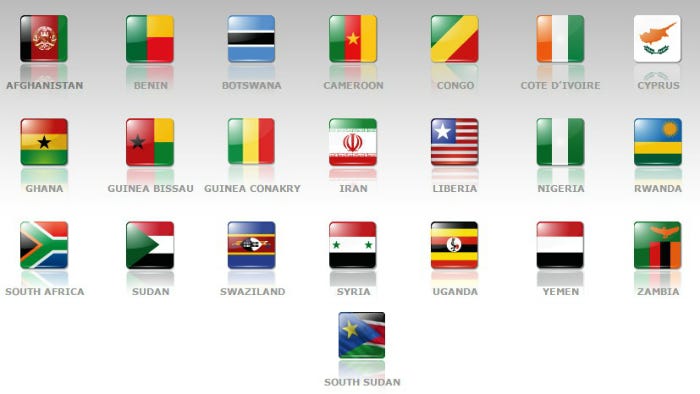
Source: mtnplay.com
Appstor.io — Allows you to create a website for your app before displaying it on their storefront. Covers paid and free apps for both major platforms.
Chillingo — More an app-discovery platform than a store, it focuses on mobile games with high production values.
Panda App — Ranks Android and iOS apps, as well as allowing user reviews. Covers wallpapers and ringtones, and has a Symbian section too.
Final Thoughts:
Google Play and the App Store have a wide reach, but other app stores fill in the gaps that they can’t get to. It’s never a bad thing to have your app in multiple storefronts, so we hope the above list will help you to increase your application’s downloads. Have we missed anything out? Let us know!
-
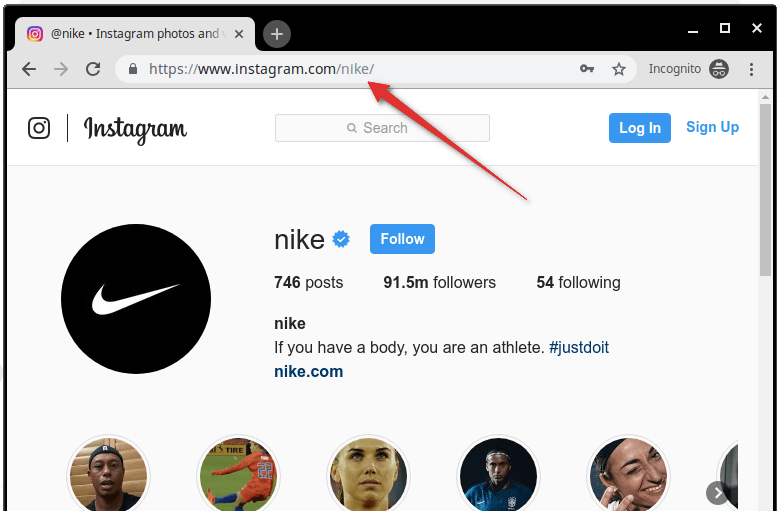
 Marketing Tips6 days ago
Marketing Tips6 days agoWhat is my Instagram URL? How to Find & Copy Address [Guide on Desktop or Mobile]
-

 Cyber Risk Management1 day ago
Cyber Risk Management1 day agoHow Much Does a Hosting Server Cost Per User for an App?
-
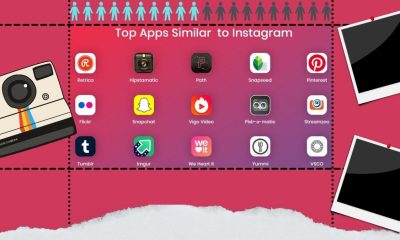
 Grow Your Business6 days ago
Grow Your Business6 days agoBest Instagram-like Apps and their Features
-

 Outsourcing Development1 day ago
Outsourcing Development1 day agoAll you need to know about Offshore Staff Augmentation
-

 Software Development1 day ago
Software Development1 day agoThings to consider before starting a Retail Software Development
-
Marketing Tips6 days ago
B2B Instagram Statistics in 2024
-

 Grow Your Business1 day ago
Grow Your Business1 day agoThe Average Size of Home Office: A Perfect Workspace
-
Solution Review1 day ago
Top 10 Best Fake ID Websites [OnlyFake?]


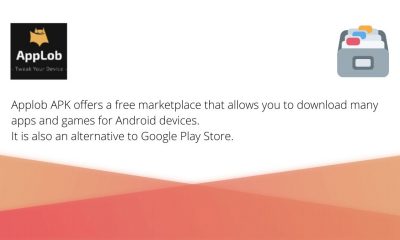


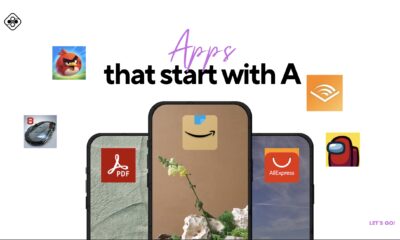

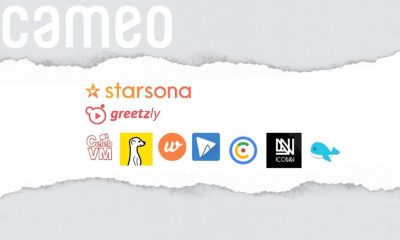

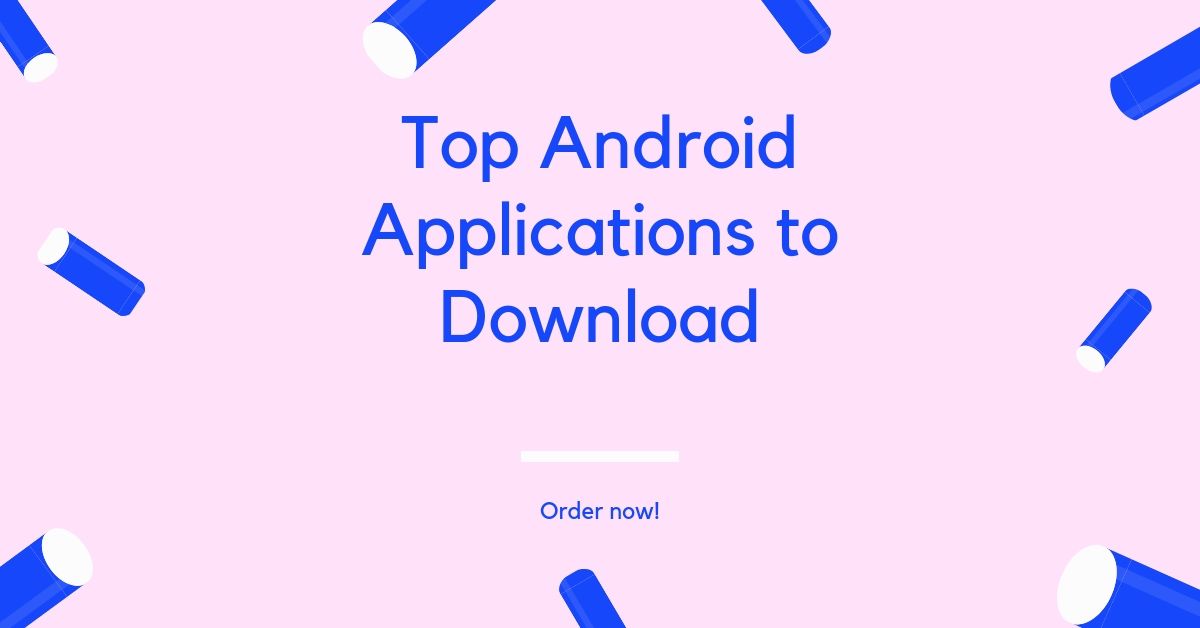



I’m impressed, I must say. Actually hardly ever do I encounter a blog that’s each educative and entertaining, and let me tell you, you’ve hit the nail on the head. Your thought is outstanding; the difficulty is one thing that not enough people are talking intelligently about. I’m very completely satisfied that I stumbled across this in my search for one thing regarding this.